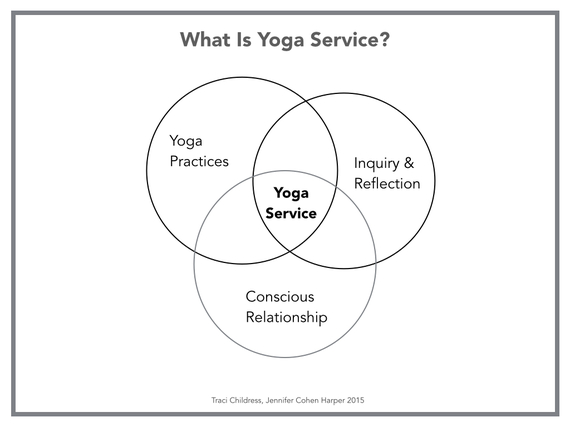Yoga service is gaining in popularity. There is a Yoga Service Council, an annual Yoga Service Conference, and numerous professionals in many disciplines working on yoga service projects -- but what exactly does the term mean? Isn't all yoga a form of service? In this interview two of the founding members of the Yoga Service Council, Jennifer Cohen Harper of Little Flower Yoga and Traci Childress of the Children's Community School of Philadelphia and the Mindful Reflection Project, explore a new working definition.
Rob: Can you tell me, what is your working definition for yoga service?
Jenn and Traci: Yoga Service: the intentional sharing of yoga practices within a context of conscious relationship, supported by regular reflection and self-inquiry.
 Can you break that down for me, and explain why this definition is needed and how it differs from the general understanding or definition?
Can you break that down for me, and explain why this definition is needed and how it differs from the general understanding or definition?
While yoga and service have long been practiced together, yoga service as a unified field is new and growing. As the field develops, the need to establish a shared understanding of what we mean by the term yoga service is essential.
We propose that yoga service is not defined by who is served, but rather by the manner in which the practices are offered.
The yoga service community often discusses its work in terms of addressing specific populations (veterans, women in prison, at-risk youth, etc.). However, all people experience vulnerability and trauma at different points in life. The circumstances of being human are such that we all, at times, are in need of the compassionate service of others. There are also social forces at play that impact individuals and communities differently, and therefore, issues of power, privilege and justice must remain at the forefront of any critical discussion of service.
As we have worked to foster conversation and exchange over the past three years of yoga service conferences, we have realized that a more nuanced definition is essential. This thinking was further informed by our experience facilitating a working meeting to develop best practices this summer. So, we propose the following working definition:
Yoga service is the intentional sharing of yoga practices within a context of conscious relationship, supported by regular reflection and self-inquiry.
What do you mean by "conscious relationship"?
Sharing yoga always takes place within the context of a relationship, and being in conscious relationship involves acknowledging the many nuances of human experience.
To be conscious of these nuances, we need to educate ourselves about social justice issues like privilege, race, language, violence, gender, poverty, and sexual orientation, as well as listen openly and with curiosity to each other's perspectives.
To exist in conscious relationship is to compassionately hold the truths about one another and the world in our interactions. It is an active attempt to see each person fully, honor each person's strengths, and acknowledge anything that is impeding the capacity to connect.
Why do you see reflection and self-inquiry as an essential part of yoga service?
To support ourselves in the practice of yoga service, we need a regular practice of reflection and self-inquiry.
Educator Parker Palmer writes, "to teach is to create a space," and that when we teach we always teach what we know.
As practitioners who share yoga with others, we create space for others to learn. We naturally offer the practices (and create our programs) through our own lens -- from the perspective of our history, privilege, bias, and wisdom. We offer yoga mixed with all the other things we know and have experienced in our lives.
A commitment to reflection and self-inquiry allows yoga service providers to engage skillfully, honestly, and authentically with students, regardless of whether teacher and students come from similar life circumstances. It helps us look closely at what we know and don't know about ourselves, those we serve and teach, and the communities we engage with. It is training to better understand our own perspective and the perspectives of our students.
Additionally, an important part of this practice is to have a system of accountability in place where we can receive regular feedback from mentors and the larger community.
A core component of yoga service is the intention with which the teachings are offered. While the intention of each teacher or program might be slightly different, the unifying factor is that the yoga practices are offered to support the empowerment and well-being of the individuals or communities with whom they are being shared.
What do you mean by yoga practices?
In this definition, we are referring to the practices that are widely included in different styles of yoga and are most often assessed in research studies: physical postures, breathwork, meditation, and deep relaxation. Other aspects of yoga, including ethical and philosophical practices and study, may also be important components of yoga service work.
Is all yoga "yoga service"?
Not all yoga is yoga service. When yoga is shared without integrating ongoing practices of self-inquiry and reflection, and without a commitment to conscious relationship, it is not yoga service.
The regular practice of yoga inevitably brings up questions related to relationship, community, and self. But it does not automatically lead to a knowledge of how to share yoga in a way that is socially just, compassionate, and aware of experiences other than our own.
We propose that yoga service requires the integration of practices that cultivate this knowledge in a way that yoga alone does not. We hope to engage our community in refining and developing this working definition of yoga service; we feel it will empower us all to share yoga in a way that is safe and respectful of those to whom we offer the practice.
Stay connected with Give Back Yoga Foundation as we share the gift of yoga with the world, one person at a time, by following us on Facebook, Twitter and Google+ and by subscribing to our newsletter.
Are you a yoga instructor giving back to underserved populations? E-mail Executive Director Rob Schware if you're interested in being interviewed for this series.


